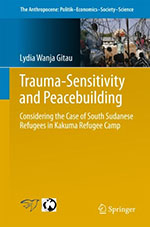APESS
Vol 12 |
Lydia Wanja Gitau: Trauma-sensitivity and Peacebuilding. Considering the Case of South Sudanese Refugees in Kakuma Refugee Camp (Cham: Springer International Publishing, 2018).
ISBN: 978-3-319-49802-7 (Softcover)
ISBN: 978-3-319-49803-4 (EBook)
Doi: 10.1007/978-3-319-49803-4_ (add chapter no.)
Order this book on Springer Website
|

|
- Diverse anecdotes and real life stories from the research participants
- Figures and charts to illustrate the content
- The journey' as a recurring motif throughout the book, weaved in a clear, easy to read style of writing
This book identifies a gap in peacebuilding theory and practice in terms of sensitivity to trauma and its impact on the survivors of war and other mass violence. The research focuses on the traumatic experiences and perceptions of peace of South Sudanese refugees in Kakuma Refugee Camp in Northwestern Kenya. It further explores the possibilities for peacebuilding identified in these perceptions. A lack of sensitivity to the trauma experienced by the survivors of conflict and mass violence leads to interventions that are at best removed from, and at worst detrimental to the welfare of the survivors. Interventions that take into consideration the complex and multifaceted ways in which the survivors experience and respond to the traumatic events, encourage capacities for resilience in the survivors, engage the creative arts in peacebuilding, and emphasise the centrality of community and relationships, are seen to assist the survivors in recovery from trauma and to facilitate peacebuilding. |